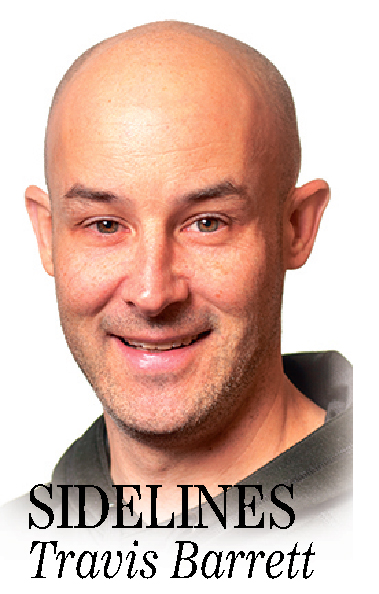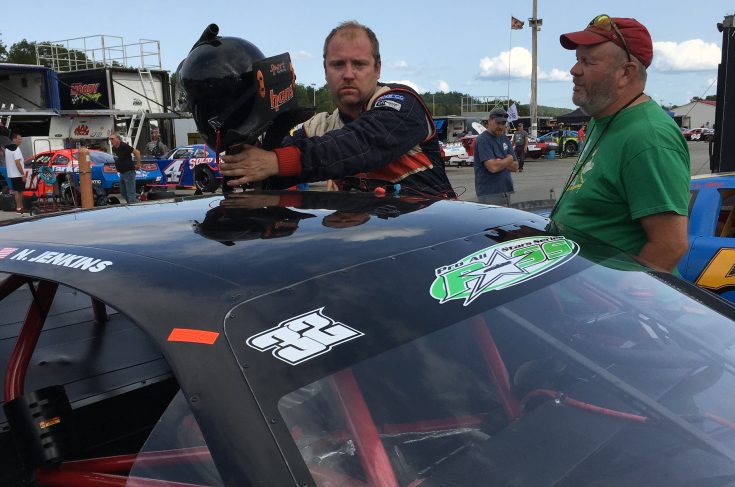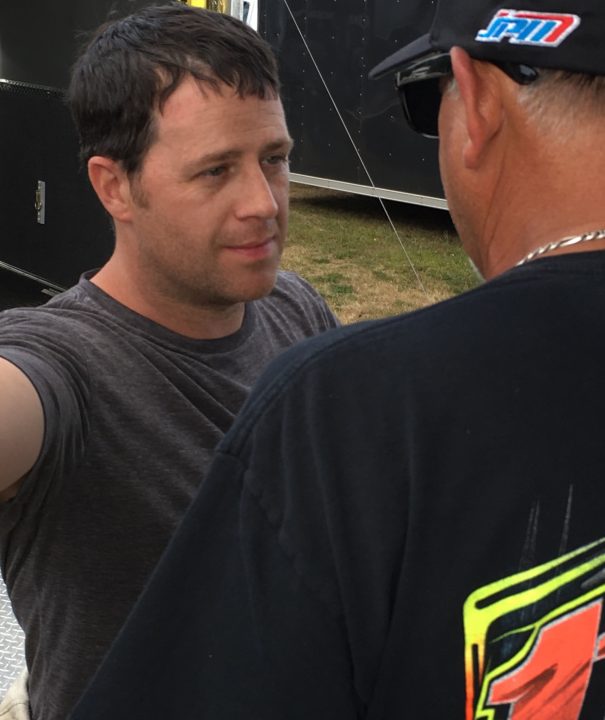Travis Benjamin, a two-time Oxford 250 winner, was en route to winning a third last summer before he was passed in the closing laps and finished second. On Friday afternoon at Oxford Plains Speedway, where the 44th edition of the annual event will be contested Sunday, Benjamin was running through the various scenarios that had taken place following the race’s final pit stops, the scenarios that ultimately kept him from joining an exclusive list of three-time Oxford 250 champions.
Benjamin, self-aware, stopped himself.
“I shouldn’t complain,” Benjamin said. “Honestly, being right there with a chance to win again is a great problem to have.”
There are, when it really boils down to it, two camps of drivers who will hit the speedway when qualifying rounds begin at 1:30 p.m. on Sunday. There are those who are trying to win the race, and then there are those who will feel as though they’ve won by simply making it to the starting grid.
Benjamin, of Morrill, is clearly in the former camp. The current Pro All Stars Series point leader knows what it takes to win the Oxford 250 — from the lucky draw for starting position in the qualifiers to the pit strategy within the race itself to the tire management throughout the entire weekend — and, given he won the most recent PASS race at the track less than a month ago, he’ll likely have himself in position to win it again this year.
“The parity we have now with this rules package, with the crate motors, it makes it so about 75 percent of the cars here have a chance to win this race,” Benjamin said. “Ninety percent of the time, the fastest car doesn’t win the race, anyway.”
Nine different drivers have won across 12 PASS races this season. Benjamin has two of them, the one at Oxford in July and one at Star Speedway in Epping, New Hampshire.
The Oxford 250, however, isn’t about the teams that win it. Sure, those teams and drivers garner plenty of attention, which is rightly deserved. But the Oxford 250 is also about the teams that never win, the drivers that never really have a chance at a check worth $25,000 with their name written on it.
One of the first questions asked every year, from fans and media, hasn’t changed in decades.
How many cars?
Unofficially, 48 cars hit the track during Friday’s three-hour practice session. Oxford Plains owner Tom Mayberry said earlier this week that he’s hoping for more than 60 entrants by Sunday’s green flag.
It’s the cars at the back end of that field, the true weekly drivers or the drivers who have never run a full season with their local touring series or at their local track, that make the Oxford 250 like no other short track race in the country.
“I’ve been at both ends of it,” Benjamin said, pointing down the pit area to the No. 32 team of Nick Jenkins, whose only career win in a race longer than 50 laps was in the Boss Hogg 150 at Wiscasset Speedway last month. “Take a guy like Nick. All he wants to do is just get in the show. Most people here just want to be a part of it. It’s so expensive now, we just don’t get enough of those guys anymore — and those are the guys we need as much as anyone.”
Two days ago, Jenkins wasn’t planning on making it to Oxford this weekend. He’d told his crew members to cancel their hotel rooms.
“It’s $6,000 for this weekend,” Jenkins, of Brownville, said. “I can take my kids to Disney for that kind of money. At some point, I have to be a responsible 35-year-old parent.”
Jenkins said he messaged dozens of small companies all across New England about sponsorship of his car for the Oxford 250.
One wrote back. That one — Neptune’s Harvest, an organic fertilizer company in Gloucester, Massachusetts, with no ties to auto racing at all — is on the car this weekend, stepping forward with just enough money to get Jenkins to the track.
Yes, he said, simply qualifying for the 250 would be cause for celebration. The pressure is on.
“The pressure on a driver like me, with a team like ours, to make this race is incredible,” Jenkins said. “I would say that the way I will feel on Sunday morning is no different from how I would feel if I went to Loudon and climbed in a (NASCAR) Cup car and tried to qualify for that race.”
The pressure, in part, stems from money. Without the guaranteed $1,000 to start the main event, Jenkins’ hopes of not blowing an entire season’s racing budget in one weekend exists.
“I bet there are 40 other guys here, too, this weekend that need to get in (the 250) just to get that $1,0000 check,” Jenkins said.
There are four multi-time Oxford 250 winners expected to be in this year’s field: Benjamin, Eddie MacDonald, Ben Rowe and Mike Rowe. Their teams operate under the assumption that qualifying is a virtual given, that winning the race is a possibility.
Then there are the Jenkins of the world, the Alan Wilsons, the Andy Saunders, the Scott Moores.
Qualifying for the Oxford 250, for teams like that, is almost as good as winning the whole thing. Capping that with an improbable Top-5 finish — like Steve Knowlton did in 2003, like Nick Nichols did in 2005, like — makes for the kind of underdog story that has made the Oxford 250 as memorable as Ralph Nason’s three-peat, Kevin Harvick’s win or Jeff Taylor’s heartaches have.
And on that end, Benjamin is right. This race needs the little guy.
“We’ve got to figure out how to get more of those cars,” Benjamin said. “We won’t be here forever if we don’t.”
Travis Barrett — 621-5621
tbarrett@centralmaine.com
Twitter: @TBarrettGWC
Send questions/comments to the editors.




